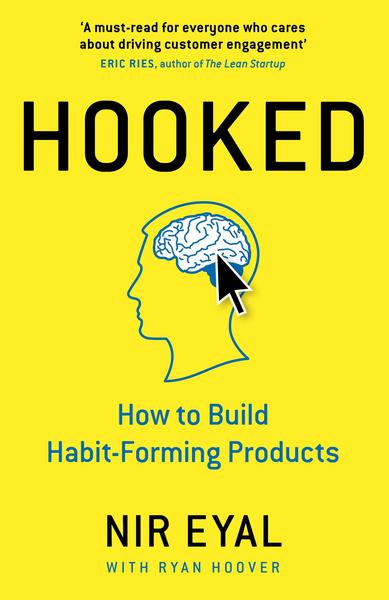 Zusammenfassungen
Zusammenfassungen
 Why do some products capture widespread attention while others flop? What makes us engage with certain products out of sheer habit? Is there a pattern underlying how technologies hook us?
Why do some products capture widespread attention while others flop? What makes us engage with certain products out of sheer habit? Is there a pattern underlying how technologies hook us?
Nir Eyal answers these questions (and many more) by explaining the Hook Model—a four-step process embedded into the products of many successful companies to subtly encourage customer behavior. Through consecutive “hook cycles,” these products reach their ultimate goal of bringing users back again and again without depending on costly advertising or aggressive messaging.
Hooked is based on Eyal’s years of research, consulting, and practical experience. He wrote the book he wished had been available to him as a start-up founder—not abstract theory, but a how-to guide for building better products. Hooked is written for product managers, designers, marketers, start-up founders, and anyone who seeks to understand how products influence our behavior.
 Bemerkungen zu diesem Buch
Bemerkungen zu diesem Buch
 In writing Hooked, my hope was that start-ups and socially concerned companies would use this knowledge to design new ways of helping people build better habits. Why should the tech giants keep these secrets to themselves? Shouldn’t we use the same psychology that makes video games and social media so engaging to design products to help people live better lives?
In writing Hooked, my hope was that start-ups and socially concerned companies would use this knowledge to design new ways of helping people build better habits. Why should the tech giants keep these secrets to themselves? Shouldn’t we use the same psychology that makes video games and social media so engaging to design products to help people live better lives? Dieses Buch erwähnt ...
Dieses Buch erwähnt ...
 Dieses Buch erwähnt vermutlich nicht ...
Dieses Buch erwähnt vermutlich nicht ... 
 Nicht erwähnte Begriffe | Bedürfnis nach Autonomieerleben, Bedürfnis nach sozialer Eingebundenheit, Hormon, Microsoft, Tiktok |
 Tagcloud
Tagcloud
 Zitationsgraph
Zitationsgraph
 Zitationsgraph (Beta-Test mit vis.js)
Zitationsgraph (Beta-Test mit vis.js)
 Zeitleiste
Zeitleiste
 18 Erwähnungen
18 Erwähnungen 
- Mein digitales Ich - Wie die Vermessung des Selbst unser Leben verändert und was wir darüber wissen müssen (Christine Grasse, Ariane Greiner) (2013)

- Die Herrschaftsformel - Wie Künstliche Intelligenz uns berechnet, steuert und unser Leben verändert (Kai Schlieter) (2015)

- Digitaler Burnout - Warum unsere permanente Smartphone-Nutzung gefährlich ist (Alexander Markowetz) (2015)


- 2. Der Spielautomat in der Hosentasche - Warum Smartphones uns abhängig machen
- Digitale Paranoia - Online bleiben, ohne den Verstand zu verlieren (Jan Kalbitzer) (2016)

- Digitale Öffentlichkeit - Wie algorithmische Prozesse den gesellschaftlichen Diskurs beeinflussen (Konrad Lischka, Christian Stöcker) (2017)


- (Un)berechenbar? - Algorithmen und Automatisierung in Staat und Gesellschaft (Resa Mohabbat Kar, Basanta Thapa, Peter Parycek) (2018)


- Team Human (Douglas Rushkoff) (2019)

- Die Zukunft der Datenökonomie - Zwischen Geschäftsmodell, Kollektivgut und Verbraucherschutz (Carsten Ochs, Michael Friedewald, Thomas Hess, Jörn Lamla) (2019)


- 15. Jenseits der puren Datenökonomie - Social-Media-Plattformen besser designen (Thilo Hagendorff)


- 15. Jenseits der puren Datenökonomie - Social-Media-Plattformen besser designen (Thilo Hagendorff)
- Taktiken der Entnetzung - Die Sehnsucht nach Stille im digitalen Zeitalter (Guido Zurstiege) (2019)

- Zucked - Waking up to the facebook catastrophe (Roger McNamee) (2019)

- Indistractable - How to Control Your Attention and Choose Your Life (Nir Eyal) (2019)

- So machen Apps süchtig - Themenspezial c't22/2019 (2019)

- So machen Apps süchtig - Die Psycho-Tricks der App-Entwickler (Jan-Keno Janssen, Sylvester Tremmel) (2019)


- So machen Apps süchtig - Die Psycho-Tricks der App-Entwickler (Jan-Keno Janssen, Sylvester Tremmel) (2019)
- Breaking the Social Media Prism - How to Make Our Platforms Less Polarizing (Chris Bail) (2021)

- Klick - Wie wir in einer digitalen Welt die Kontrolle behalten und die richtigen Entscheidungen treffen (Gerd Gigerenzer) (2021)

- Stolen Focus - Why You Can't Pay Attention- - and How to Think Deeply Again (Johann Hari) (2022)

- Learning to Live with Datafication - Educational Case Studies and Initiatives from Across the World (Luci Pangrazio, Julian Sefton-Green) (2022)

- 3. Turn off your camera and turn on your privacy (Cristobal Cobo, Pablo Rivera Vargas)
- The Anxious Generation - How the Great Rewiring of Childhood Is Causing an Epidemic of Mental Illness (Jonathan Haidt) (2024)

- The Sirens' Call - How Attention Became the World's Most Endangered Resource (Chris Hayes) (2025)


 Co-zitierte Bücher
Co-zitierte Bücher

Was Jugendliche heute wirklich bewegt
iGen
Why Today's Super-connected Kids Are Growing Up Less Rebellious, More Tolerant, Less Happy-- and Completely Unprepared for Adulthood
(Jean M. Twenge) (2018)
 Volltext dieses Dokuments
Volltext dieses Dokuments
 Bibliographisches
Bibliographisches 
 Beat und dieses Buch
Beat und dieses Buch
Beat hat dieses Buch während seiner Zeit am Institut für Medien und Schule (IMS) ins Biblionetz aufgenommen. Beat besitzt kein physisches, aber ein digitales Exemplar. (das er aber aus Urheberrechtsgründen nicht einfach weitergeben darf).










 Apple
Apple Bargeld
Bargeld Belohnung
Belohnung Choice Architecture
Choice Architecture Dopamin
Dopamin facebook
facebook Gehirn
Gehirn Geschäftsmodell
Geschäftsmodell Google
Google Instagram
Instagram iPhone
iPhone Modelle
Modelle Motivation
Motivation Random gratification
Random gratification rewards of the hunt / Belohnung der Jagd
rewards of the hunt / Belohnung der Jagd rewards of the self / Belohnung des Selbst
rewards of the self / Belohnung des Selbst rewards of the tribe / Belohnung des Stammes
rewards of the tribe / Belohnung des Stammes snapchat
snapchat social media / Soziale Medien
social media / Soziale Medien Tinder
Tinder Twitter
Twitter Unternehmen
Unternehmen











 Biblionetz-History
Biblionetz-History